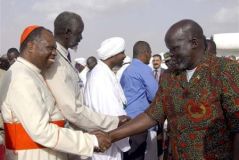Sudan ?may still have bin Laden terror camps’ – Cardinal Wako
Oct 1, 2005 (LONDON) — The London-based newspaper The Tablet reported that the Catholic Archbishop of Khartoum, Gabriel Zubeir Wako, said that nine years after Osama bin Laden was expelled from Sudan his al-Qaida network may still be operating terrorist training camps in the east part of the country.
 Saudi Arabia deported Bin Laden to Sudan in 1991 and in 1996, under pressure from the United States, Egypt and Saudi Arabia, he was expelled to Af-ghanistan.
Saudi Arabia deported Bin Laden to Sudan in 1991 and in 1996, under pressure from the United States, Egypt and Saudi Arabia, he was expelled to Af-ghanistan.
While under the protection of the Sudanese Government, bin Laden set up many agricultural and construction projects, particularly in central Gezira province, that were also used to provide facilities for terrorist training camps. Cardinal Wako said that after bin Laden left for Afghanistan, many of the structures that he created were left intact, and there had been no attempt to dismantle them.
The cardinal was speaking in London as the guest of Aid to the Church in Need about the situation in Sudan eight months after this January’s peace deal that ended 22 years of civil war between the Khartoum Government and the southern rebels of the Sudan People’s Liberation Army.
Cardinal Wako was made Archbishop of Khartoum in 1981 and much of his ministry has been to those one million who fled the war to live in camps and shanty towns around Khartoum. His tenure has also coincided with the years since the introduction of Sharia law by the Khartoum Government in 1983.
The cardinal’s response to that legislation has not been to engage in confrontation but to continue to insist on justice and peace, which he said was an ongoing challenge, and a cross that Sudanese Christians must bear on a daily basis. “Unfortunately, it is hard to address certain issues if there is a ‘religious correctness’ around. If you said there was religious persecution, everyone would be on your neck,” Cardinal Wako said. “The Government has systematically transferred Muslim judges to the South.” As for the make-up of the Khartoum Government, the presence of a Christian second vice-president was “tokenism”. “A just settlement depends on the good will of those in power,” the Cardinal said. “If we don’t take that seriously we are always on the verge of war.”
Sudan should be an example of a place where Muslims and Christians can live together and understand one another, he insisted, but when he was asked whether Muslims in the Government wanted to reach out to the minority Christian population, he said that they did so only if it was in their political interests to be seen to be doing so.
The cardinal was sceptical about the usefulness of UN peacekeepers in the South. All reports of violations have to be filtered through the Government in Khartoum, he said, and since the peacekeepers are not allowed to intervene in any confrontation it was hard to see the point of their presence.
Sudan has experienced little peace since independence in 1956; an earlier civil war lasted from 1955 to 1972. Therefore, the cardinal said, ordinary people do not have any of the skills that are needed for peacetime conditions. “The ?he is my enemy’ syndrome is very strong,” he said. “And people are seeking ?compensation’ in the widest sense. That is, they are looking for vengeance.”
(The Tablet/ST)
For the full text please go at http://www.thetablet.co.uk/cgi-bin/register.cgi/citw-past-00250
